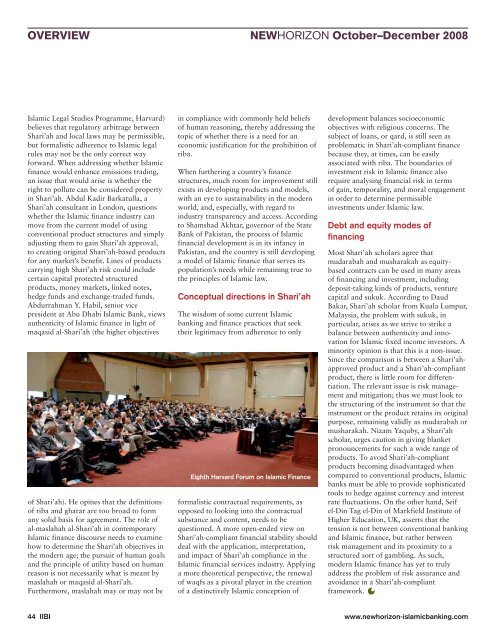azerbaijan: emerging market islamic banking and finance
azerbaijan: emerging market islamic banking and finance
azerbaijan: emerging market islamic banking and finance
You also want an ePaper? Increase the reach of your titles
YUMPU automatically turns print PDFs into web optimized ePapers that Google loves.
OVERVIEW<br />
NEWHORIZON October–December 2008<br />
Islamic Legal Studies Programme, Harvard)<br />
believes that regulatory arbitrage between<br />
Shari’ah <strong>and</strong> local laws may be permissible,<br />
but formalistic adherence to Islamic legal<br />
rules may not be the only correct way<br />
forward. When addressing whether Islamic<br />
<strong>finance</strong> would enhance emissions trading,<br />
an issue that would arise is whether the<br />
right to pollute can be considered property<br />
in Shari’ah. Abdul Kadir Barkatulla, a<br />
Shari’ah consultant in London, questions<br />
whether the Islamic <strong>finance</strong> industry can<br />
move from the current model of using<br />
conventional product structures <strong>and</strong> simply<br />
adjusting them to gain Shari’ah approval,<br />
to creating original Shari’ah-based products<br />
for any <strong>market</strong>’s benefit. Lines of products<br />
carrying high Shari’ah risk could include<br />
certain capital protected structured<br />
products, money <strong>market</strong>s, linked notes,<br />
hedge funds <strong>and</strong> exchange-traded funds.<br />
Abdurrahman Y. Habil, senior vice<br />
president at Abu Dhabi Islamic Bank, views<br />
authenticity of Islamic <strong>finance</strong> in light of<br />
maqasid al-Shari’ah (the higher objectives<br />
of Shari’ah). He opines that the definitions<br />
of riba <strong>and</strong> gharar are too broad to form<br />
any solid basis for agreement. The role of<br />
al-maslahah al-Shari’ah in contemporary<br />
Islamic <strong>finance</strong> discourse needs to examine<br />
how to determine the Shari’ah objectives in<br />
the modern age; the pursuit of human goals<br />
<strong>and</strong> the principle of utility based on human<br />
reason is not necessarily what is meant by<br />
maslahah or maqasid al-Shari’ah.<br />
Furthermore, maslahah may or may not be<br />
in compliance with commonly held beliefs<br />
of human reasoning, thereby addressing the<br />
topic of whether there is a need for an<br />
economic justification for the prohibition of<br />
riba.<br />
When furthering a country’s <strong>finance</strong><br />
structures, much room for improvement still<br />
exists in developing products <strong>and</strong> models,<br />
with an eye to sustainability in the modern<br />
world, <strong>and</strong>, especially, with regard to<br />
industry transparency <strong>and</strong> access. According<br />
to Shamshad Akhtar, governor of the State<br />
Bank of Pakistan, the process of Islamic<br />
financial development is in its infancy in<br />
Pakistan, <strong>and</strong> the country is still developing<br />
a model of Islamic <strong>finance</strong> that serves its<br />
population’s needs while remaining true to<br />
the principles of Islamic law.<br />
Conceptual directions in Shari’ah<br />
The wisdom of some current Islamic<br />
<strong>banking</strong> <strong>and</strong> <strong>finance</strong> practices that seek<br />
their legitimacy from adherence to only<br />
Eighth Harvard Forum on Islamic Finance<br />
formalistic contractual requirements, as<br />
opposed to looking into the contractual<br />
substance <strong>and</strong> content, needs to be<br />
questioned. A more open-ended view on<br />
Shari’ah-compliant financial stability should<br />
deal with the application, interpretation,<br />
<strong>and</strong> impact of Shari’ah compliance in the<br />
Islamic financial services industry. Applying<br />
a more theoretical perspective, the renewal<br />
of waqfs as a pivotal player in the creation<br />
of a distinctively Islamic conception of<br />
development balances socioeconomic<br />
objectives with religious concerns. The<br />
subject of loans, or qard, is still seen as<br />
problematic in Shari’ah-compliant <strong>finance</strong><br />
because they, at times, can be easily<br />
associated with riba. The boundaries of<br />
investment risk in Islamic <strong>finance</strong> also<br />
require analysing financial risk in terms<br />
of gain, temporality, <strong>and</strong> moral engagement<br />
in order to determine permissible<br />
investments under Islamic law.<br />
Debt <strong>and</strong> equity modes of<br />
financing<br />
Most Shari’ah scholars agree that<br />
mudarabah <strong>and</strong> musharakah as equitybased<br />
contracts can be used in many areas<br />
of financing <strong>and</strong> investment, including<br />
deposit-taking kinds of products, venture<br />
capital <strong>and</strong> sukuk. According to Daud<br />
Bakar, Shari’ah scholar from Kuala Lumpur,<br />
Malaysia, the problem with sukuk, in<br />
particular, arises as we strive to strike a<br />
balance between authenticity <strong>and</strong> innovation<br />
for Islamic fixed income investors. A<br />
minority opinion is that this is a non-issue.<br />
Since the comparison is between a Shari’ahapproved<br />
product <strong>and</strong> a Shari’ah-compliant<br />
product, there is little room for differentiation.<br />
The relevant issue is risk management<br />
<strong>and</strong> mitigation; thus we must look to<br />
the structuring of the instrument so that the<br />
instrument or the product retains its original<br />
purpose, remaining validly as mudarabah or<br />
musharakah. Nizam Yaquby, a Shari’ah<br />
scholar, urges caution in giving blanket<br />
pronouncements for such a wide range of<br />
products. To avoid Shari’ah-compliant<br />
products becoming disadvantaged when<br />
compared to conventional products, Islamic<br />
banks must be able to provide sophisticated<br />
tools to hedge against currency <strong>and</strong> interest<br />
rate fluctuations. On the other h<strong>and</strong>, Seif<br />
el-Din Tag el-Din of Markfield Institute of<br />
Higher Education, UK, asserts that the<br />
tension is not between conventional <strong>banking</strong><br />
<strong>and</strong> Islamic <strong>finance</strong>, but rather between<br />
risk management <strong>and</strong> its proximity to a<br />
structured sort of gambling. As such,<br />
modern Islamic <strong>finance</strong> has yet to truly<br />
address the problem of risk assurance <strong>and</strong><br />
avoidance in a Shari’ah-compliant<br />
framework.<br />
44 IIBI www.newhorizon-<strong>islamic</strong><strong>banking</strong>.com
















